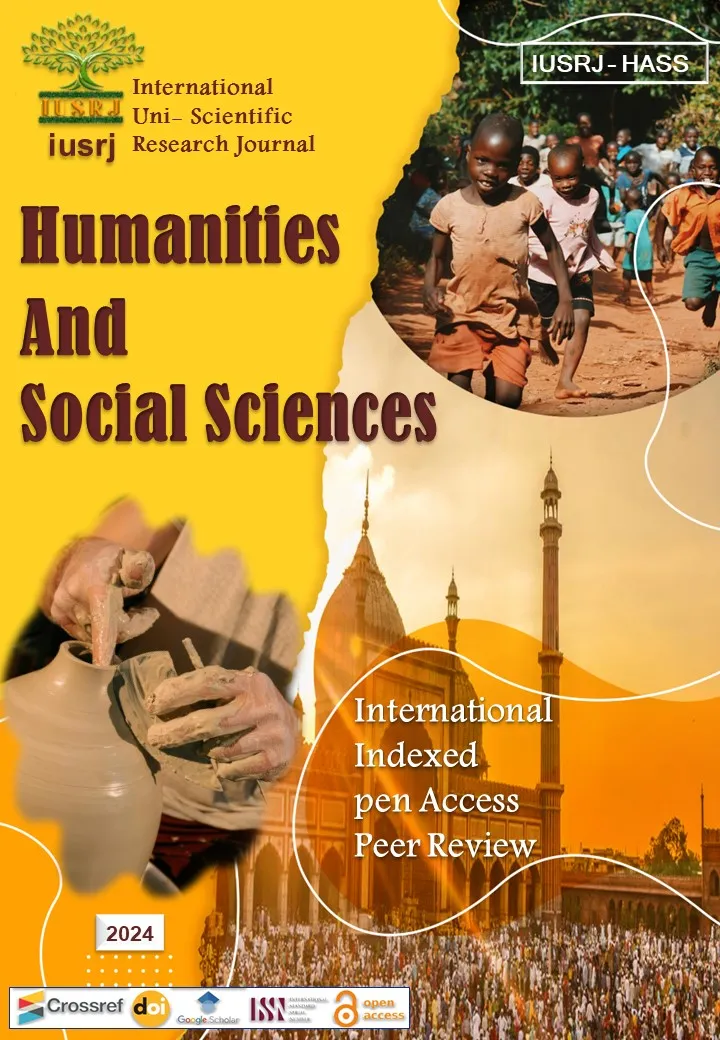Language dictionaries mention a large number of words that do not have a meaning on their own, but they acquire meaning and perform it by adding other words, and linguists call that Reduplication, and it differs from what the grammarians mean by this term, so the reduplication among grammarians is often a phonemic morphological, but for linguists it is phonemic semantic. And this research is an extension of my previous research on phonemic derivation, and I study in it the adherence in light of phonemic derivation, and the research concludes that linguistic reduplication is one of the forms of phonemic derivation. And the consequential structure is created by joining two dialect images of the same word, and in the meantime the researcher elicits the laws that govern the reduplication, by extrapolating the examples contained in him in language dictionaries and books of reduplication.
Keywords:
phonetic derivation, reduplication, substitution, synonymy
[1] Al-Azhari, Abu Mansour. (2001). Language Refinement. (i. 1). Beirut: House of Revival of Arab Heritage.
[2] Al-Istrabadi, Radhi al-Din. (1975). Adequate explanation. Libya: Garyounis University.
[3] Ibn al-Anbari, Abu Bakr. (1992). Al-Zahir in the meanings of people's words. (i. 1). Beirut: Al-Resala Foundation.
[4] Anis, Dr. Ibrahim. (1973). In Arabic dialects. (i. 4). Egypt: Anglo-Egyptian Library.
[5] Al-Baladheri, Ahmed bin Yahya. (1996). Sentences from the genealogy of the Ashrafs. (i. 1). Beirut: Dar Al-Fikr.
[6] The doorman, Dr. Ali Hussein. (1986). Following in Language. (p. 31). Jordan: Journal of the Arabic Language Academy.
[7] Al-Bayhaqi, Abu Bakr. (2003). The Great Sunan. (i. 3). Beirut: Dar Al-Kutub Al-Ilmiyya.
[8] Gohari, Ismail bin Hammad. (1987). The Crown of Language and Arabic Sahih. (i. 4). Beirut: Dar Al-Ilm for Millions.
[9] Hamawi, Abu Bakr Ali. (2014). The Treasury of Literature and the Purpose of the Lord. Cairo: General Authority for Culture Palaces.
[10] Hamwi, Yakut. (1993). Dictionary of Writers. (i. 1). Beirut: Dar al-Gharb al-Islami.
[11] Al-Khattabi, Abu Suleiman. (1982). Strange Talk. Damascus: Dar Al-Fikr.
[12] Ibn Duraid, Abu Bakr. (1987). Language Population. (i. 1). Beirut: Dar Al-Ilm for Millions.
[13] Zarkashi, Badreddine. (1994). The Ocean Sea. (i. 1). Egypt: Dar Al Ketbi.
[14] Zamakhshari, Abu al-Qasim. (D.T.) The superlative in the strange talk. (i. 2). Lebanon: House of Knowledge.
[15] Subkian, Taqi al-Din and Taj al-Din. (1995). Joy in explaining the curriculum. Beirut: Dar Al-Kutub Al-Ilmiyya.
[16] Ibn al-Sarraj, Abu Bakr. (D.T.) Origins in grammar. Beirut: Al-Resala Foundation.
[17] The son of his master, Abu al-Hassan. (2000). The Hermetic and the Great Ocean. (i. 1). Beirut: Dar Al-Kutub Al-Ilmiyya.
[18] Al-Suyuti, Jalal al-Din. (D.T.) Follow. Cairo: Al-Khanji Library.
[19] Al-Suyuti, Jalal al-Din. (1990). Analogies and isotopes. (i. 1). Beirut: Dar Al-Kutub Al-Ilmiyya.
[20] Al-Sabban, Abu Al-Irfan. (1997). Al-Sabban's footnote on Al-Ashmouni's explanation of the Alfiya of Ibn Malik. (i. 1). Beirut: Dar Al-Kutub Al-Ilmiyya.
[21] Al-San'ani, Abdul Razzaq. (1403H). Workbook. (i. 2). India: Scientific Council, Beirut: Islamic Office.
[22] Tabarani, Abu al-Qasim. (1983). The Great Lexicon. (i. 2). Beirut: House of Revival of Arab Heritage.
[23] Abu al-Tayyib, Abd al-Wahid ibn Ali. (1961). Following. (d.i). Damascus: Arabic Language Academy.
[24] Abdel Salam, Dr. Saleh Ibrahim. (1438 AH). The phonetic effect of the taste in the phenomenon of verbal follow-up: an applied study in the book of follow-up by Abu al-Tayyib the linguist. (p. 12). Medina: Taibah University Journal of Arts and Humanities.
[25] Al-Bashmi, Muhammad ibn Ahmad. (2001). Ranking of the Thursday Amali. (i. 1). Beirut: Dar Al-Kutub Al-Ilmiyya.
[26] Attar, Hassan bin Muhammad. (D.T.) Al-Attar's footnote on the explanation of the local majesty on the collection of mosques. (d.i). Beirut: Dar Al-Kutub Al-Ilmiyya.
[27] Ibn Faris, Ahmad. (1997). The companion in philology. (i. 1). Beirut: Dar Al-Kutub Al-Ilmiyya.
[28] Ibn Faris, Ahmad. (D.T.) Follow and pair. (D.T.) Cairo: Al-Khanji Library.
[29] Al-Farahidi, Al-Khalil bin Ahmed. (D.T.) Eye. (D.T.) Lebanon: Al Hilal House and Library.
[30] Al-Fayrouzabadi, Majd al-Din. (2005). Ocean Dictionary. (i. 8). Beirut: Al-Resala Foundation.
[31] Al-Qali, Abu Ali. (1926). Amalie. (i. 2). Cairo: Egyptian House of Books.
[32] Ibn Qutayba, Abdullah ibn Muslim. (D.T.) Interpretation of the problem of the Qur'an. (d.i). Scientific Library.
[33] Ibn Qutayba, Abdullah ibn Muslim. (1397 AH). Strange Hadith. (i. 1). Baghdad: Al-Ani Press.
[34] Qashash, Ahmed bin Said. (2002). Substitution in Azd Languages - A Phonetic Study in the Light of Modern Linguistics. (p. 34). Medina: Islamic University.
[35] Ibn al-Kalbi, Hisham. (1988). The lineage of Maad and the Great Yemen. (i. 1). Egypt: World of Books, Arab Renaissance Library.
[36] Kamal, D. Reggie. (1992). The Modern Hebrew-Arabic Lexicon. (i. 2). Beirut: Dar Al-Ilm for Millions.
[37] Lutfi, Numan. (2020). The Big Linguistic Bang: Phonetic Derivation. (p.2). Algeria: Journal of Interpretation and Discourse Analysis.
[38] Ibn Manzur, Muhammad ibn Makram. (1414H). Lisan Al Arab. (i. 3). Beirut: Dar Sader.
[39] Al-Harawi, Abu 'Ubayd al-Qasim ibn Salam. (1964). Strange Talk. (i. 1). Hyderabad: Ottoman Encyclopedia Press.
Citation
Numan Abdo (2021), Reduplication in light of phonemic derivation. IUSRJ International Uni-Scientific Research Journal (2)(12),60-65. https://iusrj.org/articles/doai202101310101Call for Paper

We are going to launch a new Volume, 15th of next Month of peer-reviewed OpenAcess journal publishing original research articles. IUSRJs' publish innovative papers, reviews, mini-reviews, rapid communications and scheduled to monthly. For this purpose, we would like to ask you to contribute your excellent papers in IUSRJs'. Your comments will help us improve the quality and content of the journals. The journals accepts Review Articles, Original Articles and Short Communications. Brief Report, Books Review, Thesis Submit your valuable work: Submit Now Submit your article through : [email protected]
